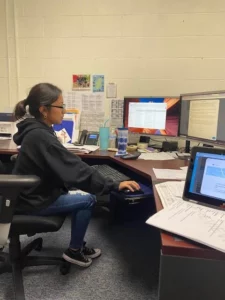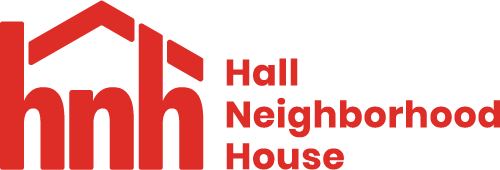The Center for First-Generation College Students reports that more than half of all undergraduates in the United States are first-generation college students, which means that neither of their parents has a bachelor’s degree.
Navigating standardized testing, application essays, financial aid, and the rest of the application process is difficult even when you have family members who have gone through it before. It’s even harder for first-generation students and their families, who are completely unfamiliar with the process.
That’s why we created a college-bound program at Hall Neighborhood House.
This holistic program doesn’t start senior year; it begins when students enter high school and gives them an understanding of how the next four years can prepare them for the rest of their lives. Best of all, it works. This year, all nine seniors in this program were accepted into college!
COLLEGE PREP STARTS EARLY
Teens in our community are eligible to join the program the summer before their freshman year. They join a tight-knit group of high schoolers at all grade levels who mentor each other, encourage each other, and learn together. They’re also mentored by Mayline, Hall’s high school coordinator, Jenn, our grant writer, and two volunteers: Dave, a retired marketing executive, and Meghan, a senior at the University of Bridgeport.

Karen submitting her Wesleyan application.
DEMYSTIFYING THE COLLEGE APPLICATION PROCESS
Applying to college is confusing, but our college program helps students and families set and reach their goals!
One of our students, Karen, is at the top of her high school class and wants to be a doctor. She joined the program as a senior with an impressive transcript and big dreams for her future.
She didn’t need us to get good grades, but she did need help navigating the financial aid process. Through the program, she learned what forms she needed and how to submit all of her information. As a result of all her hard work, she was accepted early decision to Wesleyan!
Each student in the program receives individualized support as they progress through the process so they can make their college dreams a reality.
HOW IT WORKS
The program is broken into Summer and School Year segments.
During the Summer
During the five-week summer HNH L.E.A.D.S. program, students receive a comprehensive education about the college process. They learn important skills like choosing the right classes throughout high school to ensure a strong transcript when it’s time to apply.
“We help them understand what a college-bound curriculum looks like,” Jenn said.
They meet other students in the program and learn about the clubs and extracurriculars that are available to them. They also learn about the FAFSA and other forms of financial aid, and they go on a wide variety of college tours.
“Our goal is to expose them to every type of school that’s out there,” Jenn said. “They may not get to visit every school they apply to, so we want to make sure they have at least some idea and ability to compare it to a school they’ve already seen.”
Students also start building cultural capital that might help them connect with peers or navigate social situations in the future. They see shows, go to museums, familiarize themselves with place settings at fancy meals, and learn how social and cultural capital can be useful to them as they head to a new place.
The last part of the summer curriculum is leadership and development. Students learn to solve problems through teambuilding activities and set a code of conduct for their time together. They build their own little community and hold each other accountable for their individual, ambitious goals.
“They start seeing themselves as leaders and then have opportunities to demonstrate the skills that they see that they have,” added Jenn.
During the School Year
Students can come to the college program three times a week during the school year. They’re busy with sports, extracurriculars, and jobs, so they don’t always make it all three days—but they are there regularly.
Each session starts with a check-in, providing an opportunity to celebrate acceptances, encourage individual students as they work toward their goals, and set the tone of their time together.
Then, students break apart into groups to work on their individual needs and tasks. Some take part in tutoring for subjects they’re struggling with, while the seniors in the group are often working on application essays or scholarships.
A NEW EXPERIENCE FOR STUDENTS AND PARENTS
This year, as the acceptances started coming in, we started planning more college visits—for both students and their parents. These visits give families important information they need to decide their next steps together.
After Karen got into Wesleyan, for example, her parents were excited but nervous about her being so far from home. They had never attended college and weren’t sure what to expect for their daughter. They wanted to make sure she would be safe and taken care of on campus.
On the tour, they saw how safe and secure the campus was and were amazed by all of the opportunities and resources Karen could take advantage of. When they learned about Wesleyan’s high rate of students getting into medical school, they were sold! They left the visit confident it was the right choice, even though it was farther away than some of the other schools Karen got into. And Karen was so excited to show them her top choice.
LOOKING TO THE FUTURE
Seniors may be heading off to different schools in the fall, but they will remain connected to their friends and mentors in the program.
“We’ll get them together in January, and they’ll stay in communication with their friends who haven’t graduated yet,” said Jenn. “That way, we can build the alumni group and build the culture of college knowledge in our community.”
Through the college program, our students will keep learning and building pathways to the futures they want to have.
